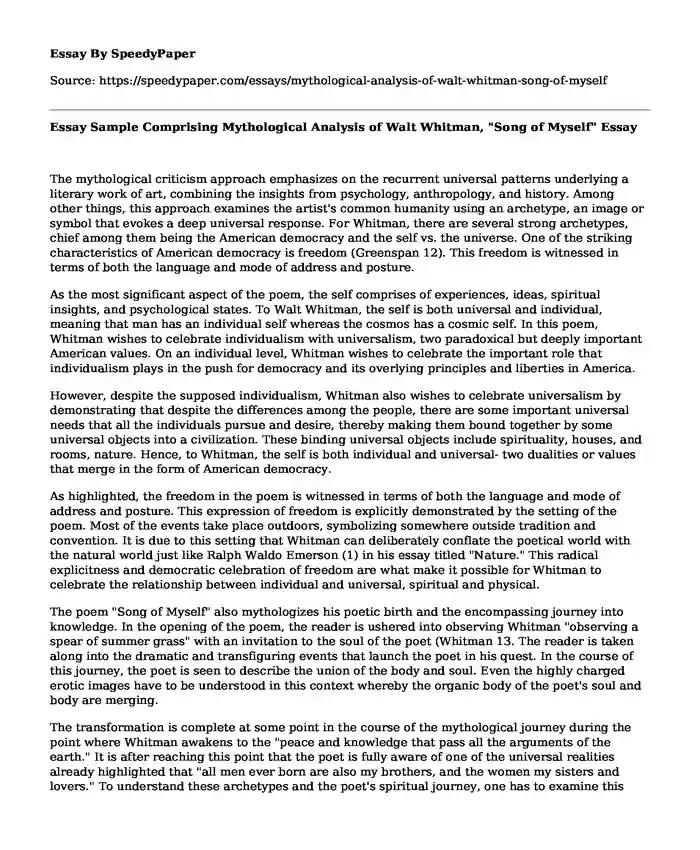
| Type of paper: | Essay |
| Categories: | Poem Walt Whitman |
| Pages: | 3 |
| Wordcount: | 596 words |
The mythological criticism approach emphasizes on the recurrent universal patterns underlying a literary work of art, combining the insights from psychology, anthropology, and history. Among other things, this approach examines the artist's common humanity using an archetype, an image or symbol that evokes a deep universal response. For Whitman, there are several strong archetypes, chief among them being the American democracy and the self vs. the universe. One of the striking characteristics of American democracy is freedom (Greenspan 12). This freedom is witnessed in terms of both the language and mode of address and posture.
As the most significant aspect of the poem, the self comprises of experiences, ideas, spiritual insights, and psychological states. To Walt Whitman, the self is both universal and individual, meaning that man has an individual self whereas the cosmos has a cosmic self. In this poem, Whitman wishes to celebrate individualism with universalism, two paradoxical but deeply important American values. On an individual level, Whitman wishes to celebrate the important role that individualism plays in the push for democracy and its overlying principles and liberties in America.
However, despite the supposed individualism, Whitman also wishes to celebrate universalism by demonstrating that despite the differences among the people, there are some important universal needs that all the individuals pursue and desire, thereby making them bound together by some universal objects into a civilization. These binding universal objects include spirituality, houses, and rooms, nature. Hence, to Whitman, the self is both individual and universal- two dualities or values that merge in the form of American democracy.
As highlighted, the freedom in the poem is witnessed in terms of both the language and mode of address and posture. This expression of freedom is explicitly demonstrated by the setting of the poem. Most of the events take place outdoors, symbolizing somewhere outside tradition and convention. It is due to this setting that Whitman can deliberately conflate the poetical world with the natural world just like Ralph Waldo Emerson (1) in his essay titled "Nature." This radical explicitness and democratic celebration of freedom are what make it possible for Whitman to celebrate the relationship between individual and universal, spiritual and physical.
The poem "Song of Myself" also mythologizes his poetic birth and the encompassing journey into knowledge. In the opening of the poem, the reader is ushered into observing Whitman "observing a spear of summer grass" with an invitation to the soul of the poet (Whitman 13. The reader is taken along into the dramatic and transfiguring events that launch the poet in his quest. In the course of this journey, the poet is seen to describe the union of the body and soul. Even the highly charged erotic images have to be understood in this context whereby the organic body of the poet's soul and body are merging.
The transformation is complete at some point in the course of the mythological journey during the point where Whitman awakens to the "peace and knowledge that pass all the arguments of the earth." It is after reaching this point that the poet is fully aware of one of the universal realities already highlighted that "all men ever born are also my brothers, and the women my sisters and lovers." To understand these archetypes and the poet's spiritual journey, one has to examine this poem through a mythological criticism (Whitman 16).
Works Cited
Emerson, Ralph W. Nature, and Other Essays. Mineola, N.Y.: Dover, 2008. Print.
Greenspan, Ezra. Walt Whitman's Song of Myself: A Sourcebook and Critical Edition. New York, NY: Routledge, 2013. Print.
Whitman, Walt. Song of Myself. Frankfurt Main: Musaicum Books, 2017. Print.
Cite this page
Essay Sample Comprising Mythological Analysis of Walt Whitman, "Song of Myself". (2022, Feb 18). Retrieved from https://speedypaper.net/essays/mythological-analysis-of-walt-whitman-song-of-myself
Request Removal
If you are the original author of this essay and no longer wish to have it published on the SpeedyPaper website, please click below to request its removal:
- Essay Example: Why Would People Develop a Phobia of Homosexual
- Twelve Characteristics of an Effective Teacher: Essay Example
- Free Essay Describing the Investigation of Credit Card Fraud
- HIV/AIDS Prevention and Modality, Free Paper with the Annotated Bibliography
- Environment Essay Example: Ocean Plastics
- Free Essay Sample: Culture and Structure
- Essay Example on Bipolar Disorder: Abnormal Psychology in the News
Popular categories




